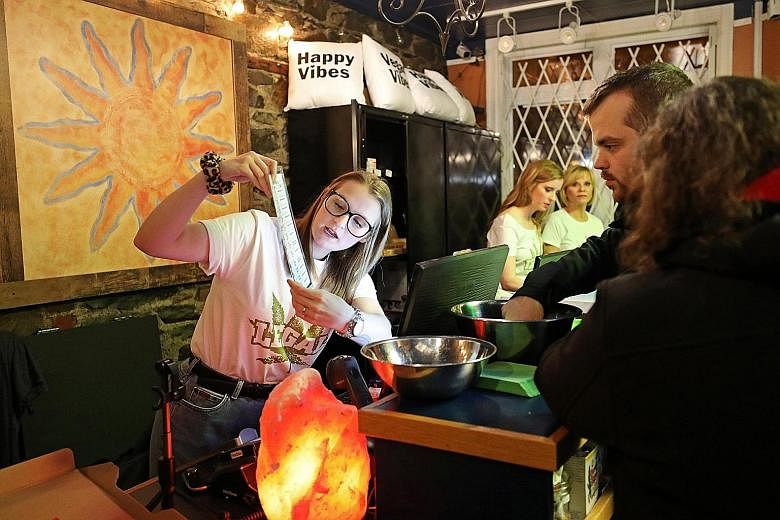OTTAWA • Canada yesterday became the first major Western nation to legalise and regulate the sale and recreational use of marijuana.
It was praised by enthusiasts and investors in a budding sector that has seen pot stocks soar on the Toronto and New York exchanges, but questioned by health professionals and opposition politicians.
"We're not legalising cannabis because we think it's good for our health. We're doing it because we know it's not good for our children," Prime Minister Justin Trudeau said on the eve of the reform. "We know we need to do a better job to protect our children and to eliminate or massively reduce the profits that go to organised crime."
The Cannabis Act, which fulfils a promise he made in the 2015 election campaign, makes Canada the second nation after Uruguay to legalise the drug. Its implementation will be scrutinised by Canadians ahead of the 2019 election and other nations the he said may follow suit if it proves a success.
Mr Trudeau himself admitted in 2013 to having smoked pot five or six times in his life, including at a dinner with friends after being elected to Parliament. He has also said that his late brother Michel was facing marijuana possession charges for a "tiny amount" of pot before his death in an avalanche in 1998, and that it influenced his decision to propose legalising cannabis.
Statistics Canada says 5.4 million Canadians will buy cannabis from legal dispensaries this year - about 15 per cent of the population. Around 4.9 million already smoke.
Under new regulations, Canadians of at least 18 or 19 years old (soon to be 21 in Quebec) will be allowed to buy up to 30 grams of cannabis and grow up to four plants. A patchwork of private and public cannabis retail stores and online sales have been set up across the 13 provinces and territories, ramping up to 300 store fronts by year's end, the government predicts. Sales of derivatives like edibles will be legalised next year.
To meet demand, hundreds of growers have been licensed. This new industry has drawn billions in funding and interest from alcohol and soft-drink makers like Constellation Brands and Coca-Cola which have expressed interest in developing cannabis-infused drinks.
Cannabis sales are forecast to boost economic growth by up to C$1.1 billion (S$1.5 billion) and provide a C$400 million tax revenue windfall for the government, according to Statistics Canada.
Public health officials contend that smoking cannabis is as harmful as tobacco, but welcome the opportunity for open dialogue. Some doctors, however, are wary. Canadian Medical Association Journal's editor in chief Diane Kelsall called legalisation "a national, uncontrolled experiment in which the profits of cannabis producers and tax revenues are squarely pitched against the health of Canadians".
Police, meanwhile, are scrambling to prepare for a predicted uptick in drug-impaired driving.
A recent Abacus Data poll showed 70 per cent of Canadians accept or support legalisation.
AGENCE FRANCE-PRESSE

